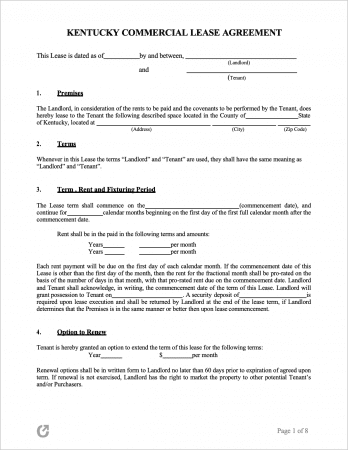
The Kentucky Lease Agreements are written contracts completed prior to a tenant (lessee) moving into a rental property. The forms ensure the parties understand their rights and obligations and hold the tenant(s) to their obligation to pay rent until the contract’s expiration date (monthly leases not included). Although technically negotiable, the terms contained with residential-based leases are often accepted by tenants without argument. In comparison, commercial leases are known to change significantly from the time the parties sit down to discuss terms to the moment they sign.

Commercial Lease Agreement – To be used solely for renting property to businesses for commercial use.
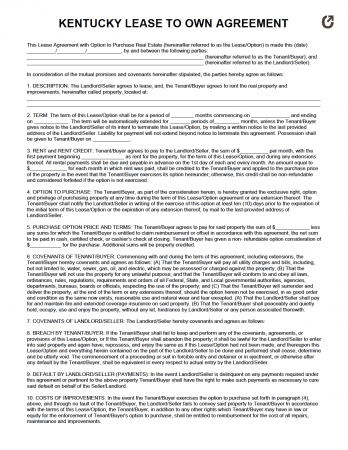
Lease to Own Agreement – Often referred to as a “Lease Option”, the document contains provisions for a tenant to *optionally* purchase the rented home from the landlord at the end of the lease.
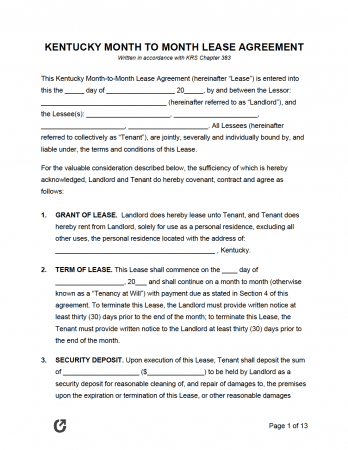
Month-to-Month Lease Agreement – Similar to a standard lease with the major difference being that it doesn’t have a predetermined end date. Can be terminated by either the landlord or tenant(s).
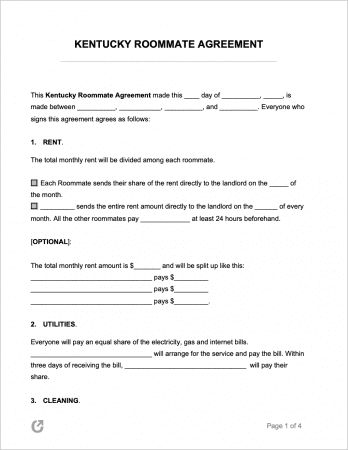
Roommate Agreement – A document completed separately to a lease that sets guidelines among roommates living in the same rented home, apartment, or college dorm.
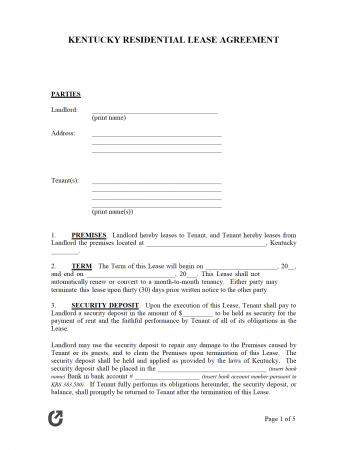
Standard Residential Lease Agreement – Used for the majority of renting situations – binds a landlord and tenant into a lease for an average length of one (1) year.
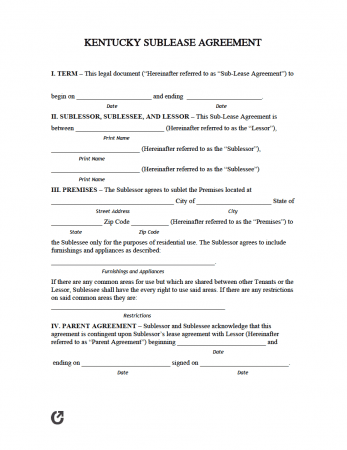
Sublease Agreement – So long the landlord permits its use, a sublease is a secondary rental contract that is formed between a tenant and subtenants, who will “take over” the lease from the original tenant.
A Kentucky Lease Agreement is a legal form that formalizes a deal where a property is leased for residential or commercial purposes. In order to abide by the stipulations contained within the contracts, both parties should thoroughly read through each page before signing. Prior to signing a lease, landlords should make use of a rental application, which they can require prospective tenants to complete as a means of vetting them.
Landlord-Tenant Guides / Handbooks
In line with KRS § 383.565(2), rent must be paid at the time and place agreed upon by both the landlord and tenant. Unless there is some agreement to the contrary, rent should be paid in equal monthly installments at the beginning of each month at the dwelling unit. Periodic rent must be paid at the beginning of any term of one (1) month or less.
Emergency (§ 383.615(2)): In an emergency, landlords can enter an occupied rental property without the consent of the tenant(s).
Non-Emergency (§ 383.615(3)): Landlords must give tenants at least two (2) days’ notice of their intent to enter unless it is impractical to do so. The entry must only take place at reasonable times.
Landlords need to uphold the following duties, as required by statute 383.595:
Per Kentucky statute 383.605, tenants are obligated to uphold the following:
Maximum: There is no state law specifying a maximum security deposit amount landlords may charge tenants.
Returning to Tenant (§ 383.580(7)): Must send a notice to the tenant’s last known address stating their refund owed. If the landlord doesn’t receive a response within sixty (60) days after sending the notification, the landlord can keep the deposit.
Deposit Interest: No statute.